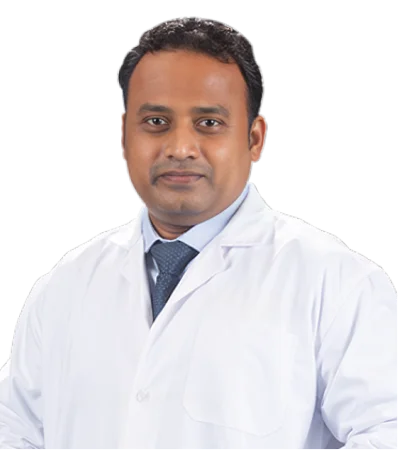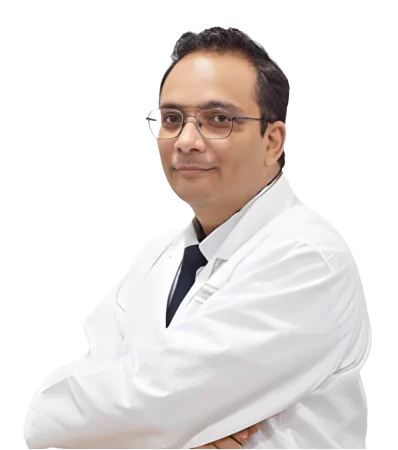Thyroid Surgery
Improved Thyroid Function and Wellness
A thyroidectomy is special procedure that is used to treat a variety of thyroid diseases, such as benign and malignant issues. Thyroid glands, situated at the neck’s base is a key component in the regulation of metabolism growth, energy, and levels. In Chirayu Super Speciality Hospital, we provide advanced thyroid surgery conducted by highly skilled endocrinologists and surgeons. Our aim is to offer a precise diagnosis, efficient treatment and complete care to improve the health of your thyroid and improve the overall quality of your life.

What is Thyroid Surgery?
Thyroid surgery is the removal of some or the entire thyroid gland in order to treat issues like thyroid nodules, thyroid cancer, goiter or hyperthyroidism. The procedure may involve procedures like thyroidectomy (removal of the entire thyroid gland) or the lobectomy (removal of a single lobe of the thyroid gland). The procedure’s specifics depend on the nature and severity of the thyroid disease as well as the person’s general health.
Who Performs Your Surgery?
Thyroid procedures in Chirayu Super Speciality Hospital are performed by highly experienced endocrinologists and surgeons who have extensive knowledge of thyroid surgery. Our surgeons employ the most modern techniques and technologies to ensure precision and efficient treatment. Our surgical staff is aided by highly skilled anesthesiologists as well as nursing staff who provide complete assistance prior to, during, and after the procedure, to ensure the best possible outcome and security.
Types of Thyroid Surgery
- Total Thyroidectomy : Removal of the entire thyroid gland, typically performed for thyroid cancer or severe cases of hyperthyroidism.
- Partial Thyroidectomy : Removal of one lobe of the thyroid gland, often used for benign nodules or localized thyroid cancer.
- Subtotal Thyroidectomy : Removal of a significant portion of the thyroid gland, leaving a small amount of tissue to maintain some thyroid function.
Symptoms Indicating the Need for Thyroid Surgery
- The presence of suspicious or large thyroid nodules that could be cancerous.
- A significant increase in the size of the thyroid gland (goiter) that causes breathing difficulties or difficulty swallowing.
- The symptoms that persist or get worse are a sign from hyperthyroidism (e.g. rapid heartbeat or weight loss, tremors, etc.)
- Thyroid cancer diagnosis requires surgery for effective treatment.
- Thyroiditis intractable or inflammation that causes serious signs or symptoms.
Diagnosis for Thyroid Surgery
The diagnosis is made after a thorough assessment by an endocrinologist which includes a physical exam and examination of the symptoms. Diagnostic tests like thyroid function tests ultrasound Fine needle aspiration biopsy as well as imaging tests (e.g., CT scan) can be used to evaluate the condition of the thyroid gland and help plan surgical procedures. The results can help determine the kind of thyroid surgery that is required and the most appropriate method of treatment.
Treatment Process
The process of treatment requires a thorough consultation with the doctor for discussion of the patient’s diagnosis, options for treatment and surgical options. Thyroid surgery is done under general anesthesia. The procedure is specifically tailored to the conditions and needs for the person. The post-operative treatment includes the management of pain, evaluating the thyroid’s function and then following up through hormone-replacement therapy when required. Regular check-ups are required to ensure that healing is complete and to address any issues.
Care and Recovery After Surgery
The process of recovering from thyroid surgery has many key elements. It is recommended that patients take a break and follow post-operative treatment instructions that include managing pain as well as watching for signs of complications. Regular follow-up appointments are crucial to check the thyroid’s function, modify the therapy for hormone replacement if necessary and to ensure that the healing process is complete. The majority of patients can return to routine activities within a few weeks, while monitoring continues to ensure optimal thyroid health.
Advantages of Choosing Our Surgery Services
Experienced Specialists
Our team of endocrinologists and surgeons brings extensive experience in thyroid surgery, ensuring accurate diagnosis and effective treatment for thyroid disorders.
Personalized Treatment
Each patient receives a tailored treatment plan based on their specific condition, ensuring the most effective and appropriate surgical approach for their needs.
Comprehensive Care
From pre-surgical evaluations to post-operative support, we offer a comprehensive approach to thyroid health, addressing all aspects of your care for a smooth recovery.
What Our Patients Say
Read about our patients positive experiences and how Chirayu Super Speciality Hospital has positively impacted their health and well-being.


The thyroid surgery at Chirayu has been transformative. The results are remarkable, and the support from the team was exceptional throughout.


My experience with thyroid surgery at Chirayu was positive. The outcomes exceeded my expectations, and the care provided was excellent.


Chirayu team provided exceptional medical care during my thyroid surgery. The results have been excellent, and I’m very satisfied.


The thyroid surgery at Chirayu was life-changing. My symptoms have greatly improved, and the care I received was outstanding!
Meet Our Medical Specialists
Our skilled thyroid specialists provide expert surgical care, using advanced techniques to effectively treat thyroid conditions and enhance your well-being.
Frequently Asked Questions
Here, we provide answers to some of the most commonly asked questions to help you better understand about our surgery services. If you have any additional questions, please do not hesitate to contact us.
Thyroid surgery involves the removal of part or all of the thyroid gland to treat conditions such as thyroid nodules, goiter, or thyroid cancer.
Candidates include individuals with significant thyroid issues such as large nodules, goiter causing symptoms, or thyroid cancer requiring surgical intervention.
Recovery includes managing pain, following post-operative care instructions, and monitoring thyroid function. Most patients return to normal activities within a few weeks.
Risks include bleeding, infection, voice changes, and thyroid hormone imbalances. Our team takes measures to minimize these risks and ensure a successful outcome.
Thyroid surgery typically takes about 1 to 3 hours, depending on the complexity of the procedure and the extent of thyroid removal required.



